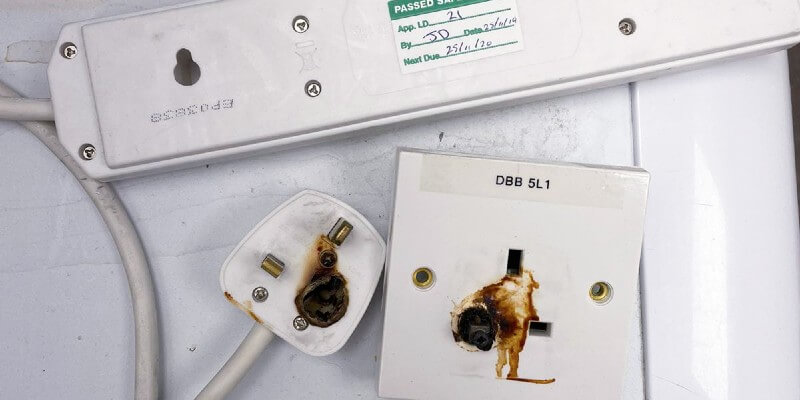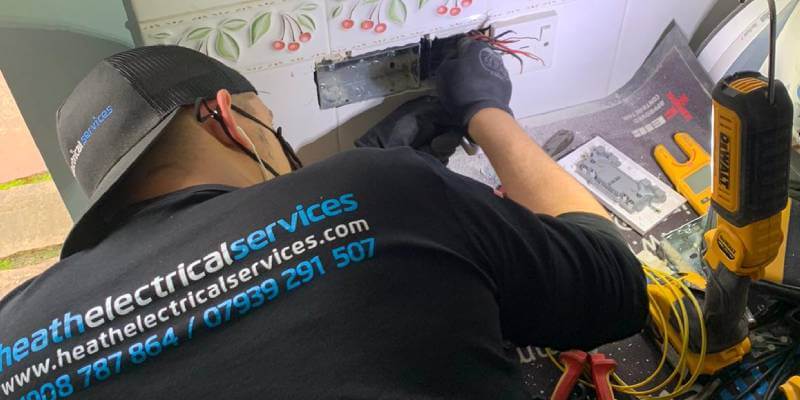Whether it may be watching TV, charging our phones or using a hairdryer, there is a wealth of everyday activities that require a plug socket, making them a necessity in every property. However, when they start to play up and show signs that the end is near, it is important not to neglect the issue, as failing to replace plug sockets comes alongside several dangers.
If you are spotting small problems with your outlets but are unsure of the severity and whether a replacement is necessary, then we have put together a guide on everything you need to know. Here are some common signs that you need to replace your plug sockets and tips for damage prevention.
When to replace plug sockets
As we rely on electricals on a daily basis, it can be incredibly frustrating when outlets start to make your life far harder than it needs to be. There are many reasons why plug sockets are no longer serving their purpose, some more severe than others. Knowing how to spot these is vital in keeping your property protected, particularly against electrical fires.
To ensure that your home or commercial premises can stay safe, we are going to run through the following:
- Signs that it’s time to replace a plug socket
- Can you replace plug sockets yourself?
- How to prevent damaged plug sockets
- Replacement plug socket FAQs

Signs that it’s time to replace a plug socket
In order to spot the need for replacement before problems grow in severity, it is important to ensure that you familiarise yourself with the key signs that your sockets are failing. This is beneficial not only for property owners but, in fact, everyone, as it allows you to recognise which sockets are potentially dangerous, so you know to steer clear. With this in mind, the most common signs that your plug sockets need replacing are as follows:
1. Your lights are flickering
When wiring is faulty, the likelihood of loose connections increases, which is the main cause of flickering lights. It means that your plug sockets are no longer able to withstand the load needed to power the lights, leading to constant trips. This is most common in properties with outdated sockets as they would have been designed to withstand far more straightforward appliances, not modern alternatives which require a huge stream of electricity to operate successfully. As a result, your sockets will become more susceptible to short circuits, making a replacement before damage is caused to your property essential.
2. You notice heat scorch marks
Whether it may be a build-up of dust inside the plug socket or poor wiring, there are several causes of heat scorch marks, all of which are key indicators that you must schedule a replacement. It is absolutely essential that you stop using the socket the moment that you notice signs of overheating by switching off the outlet from the mains and then unplugging your appliances. Failing to do this does risk an electrical fire.
If you do notice severe damage to your sockets and are worried about the risks, our emergency electricians in Milton Keynes are available both locally and in the surrounding areas. They would always be more than happy to assess the condition of your electricians before recommending the best solution.

3. The fuses regularly blow
There is nothing worse than attempting to use an appliance, and the fuse blows. There are many reasons why your fuses keep blowing, the first of which is a short circuit fault. This occurs when a section of the wire carrying the electric current touches another part of the circuit, lowering the resistance of the path of electricity. In this instance, it is highly recommended to contact a certified electrician to complete an electrical inspection.
Another cause of your fuse blowing is a circuit overload, which is simply down to too many appliances trying to draw power from the fuse board. When your circuit breakers notice that you have exceeded your limit, they will shut off the circuit to prevent it from overheating and causing dangerous repercussions. For more information on what happens when a fuse blows, take a look at The Spruce.
4. Wires have become loose
If you have noticed that particular plug sockets build up far more heat than others, then it is likely that you are experiencing loose wiring. It shows that the terminals are inadequate, most commonly through lack of maintenance, meaning that an abnormal amount of heat is starting to build up. Much like the above sign, loose wires can cause your electricals to trip, so it is crucial to get this looked at as soon as possible.
5. Appliances fall out of the sockets
Now, this sign is pretty noticeable, but it is one of the most common problems that property owners put off resolving until they have no other choice than to do so. Should you plug in your appliance and it slides straight out of the outlet holes, then it is time for a replacement. This is likely to be caused by wear and tear as the constant plugging and unplugging can cause the spring mechanisms to no longer serve their purpose. Not only can this be incredibly frustrating, but it can also prove dangerous as the outlet can overheat, leading to melting and fires.

6. There is a burning smell
Although this may sound obvious, it is imperative never to continue using a plug socket if you have started to notice a burning plastic smell or there is visible smoke. It is a sure indication that there is both corrosion and built-up debris, which has begun to burn off due to overheating. Should this occur, immediately switch off your power supply and get in touch with an emergency electrician.
7. Sounds coming from the sockets
No one ever wants to hear a strange buzzing, cracking or popping sign coming from their plug socket, and just as you can imagine, this is a sign that a replacement is needed. It shows that electrical arcing is occurring, which is caused by currents jumping a gap in a circuit between two electrodes. The most common cause of arcing is loose or damaged wires, both of which are capable of causing a fire. Fire Trace International has put together a helpful guide with more information on arcing, helping you to detect problems ahead of time.
8. Unwanted ‘goo’ around the socket
For those with an older property that was built and wired between the 1960s and 70s, a green-coloured ‘goo’ may start to form around your socket. Between 1965 and 1971, the wiring was designed with a particular type of copper and insulation, which, when put together, causes a reaction that creates this substance.
Much like the other signs mentioned above, rectifying this issue will require the expertise of an electrician and is likely to mean that your house needs to be rewired. Our experienced electricians in Milton Keynes are just a call away, should you require their help with this.

Can you replace plug sockets yourself?
There are several regulations in place that limit the amount of electrical work that you can do independently without the assistance of a certified electrician. These have been implemented to ensure that alterations comply with Part P of the Building Regulations and meet with strict health and safety standards.
The regulations state that the only work that can be completed through DIY methods is minor maintenance and replacement jobs, mainly for aesthetic benefits. This includes replacing the plastic cover of a socket with a ‘like for like’ alternative or fitting new ceiling pendants. Anything further falls under the ‘notifiable work’ category, which means that a professional must be enlisted, and applications to the Building Regulations must be submitted.
As a result of this, should you be experiencing any of the above warning signs of a faulty plug socket, you should never attempt to carry out remedial work independently. Instead, you must get in touch with a certified electrician who will assess the dangers before going ahead with the replacement. If you would like more information on this topic, then we suggest taking a look at the Warwick District Council website, which has a super helpful page on renovating your electricals.
As well as homeowners, it is vital to highlight that the above regulations also relate to landlords. In fact, there are several additional tasks that landlords must complete in order to stay within the law. Not only is it your responsibility to ensure that any electrical problems raised by tenants are resolved as quickly as possible, but there are also various electrical safety checks which have become mandatory. Our previous article runs through the essential maintenance tasks that landlords must complete.

How to prevent damaged plug sockets
Once you have replaced your plug sockets, whether it has been just a few or you have chosen to rewire your property, it will be important to ensure that you do not have to complete the task all over again in a few years’ time. Luckily, there are a number of different ways that you can reduce the risk of damaged plug sockets, such as:
- Professionally install appliances – if you are unsure about how to install a larger appliance and worried whether the socket could withstand the connection, then it is always better to speak with professionals. Our team frequently provide home appliance installations, so we would be happy to help! You should also ensure that you only ever invest in quality appliances, not those that are cheap replicas, as these are known for causing electrical fires.
- Regularly check sockets – now that you are familiarised with the key signs that an issue is brewing, it will take just a few minutes once a month to check whether they have appeared on any plug sockets. This will allow you to spot any issues ahead of time and resolve them before they grow.
- Avoid overloading outlets – have you ever heard of the phrase ‘daisy-chaining’? This is when extension cables are plugged into one another, causing your socket to overwork to supply power, often resulting in overloading. Prevent this issue by spreading power across several outlets rather than just one.
- Remove plugs carefully – it can be easy to remove plugs by pulling on the wire, but this does more harm than you would expect to the outlet. Instead, ensure that they are carefully removed using the plug itself to prevent damage.
- Have your electricals regularly tested – by ensuring that both your electrical installations and appliances are properly maintained and monitored, you can prevent more extensive damage from occurring to your plug sockets. If you’re in need of electrical inspections and testing in Milton Keynes, please do not hesitate to get in touch with our friendly team.

Replacement plug socket FAQs
Here are the answers to some common questions people have surrounding the replacement of plug sockets:
How do I replace a plug socket?
If your plug socket is in need of replacement, you will need to call a professional for help. However, if you would just like to know how to replace a plug socket cover, check out this guide on HomeServe.
How do I replace a fuse in wall socket?
If you are wondering how to replace a fuse in a wall socket, we highly recommend that you get in touch with our team of qualified electricians for help in order to avoid an electrical accident.
How much does it cost to replace a plug socket?
The cost of having your plug sockets replaced will depend on factors such as the current condition of the sockets, how many need replacement, and the quality of the socket covers you would like. Feel free to request a call back from one of our electricians if you would like an obligation-free quote!

Know when to replace your plug sockets
We are all more than aware of the dangers of electricity, so ensuring that your property is protected against these is vital. Whether you have a new build or an older, traditional home, every power outlet has the potential to become damaged from either poor installation, general wear and tear or lack of maintenance. It is important to keep an eye out for these and as always, if you spot a problem, get in touch with a professional instead of attempting to rectify the issue yourself, in order to prevent things from becoming more hazardous. If you are in need of the help of either domestic or commercial electricians in Milton Keynes, our team members are highly trained and more than happy to help.












